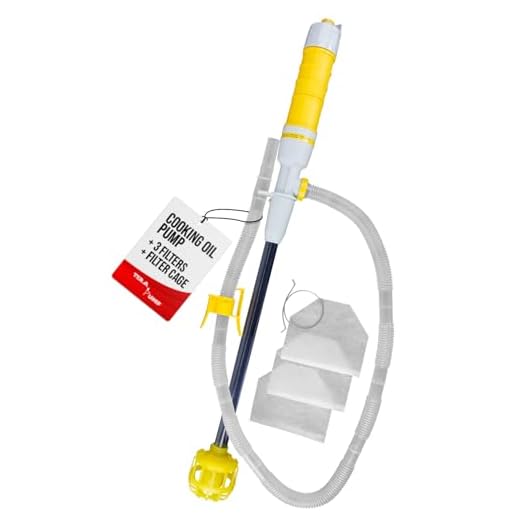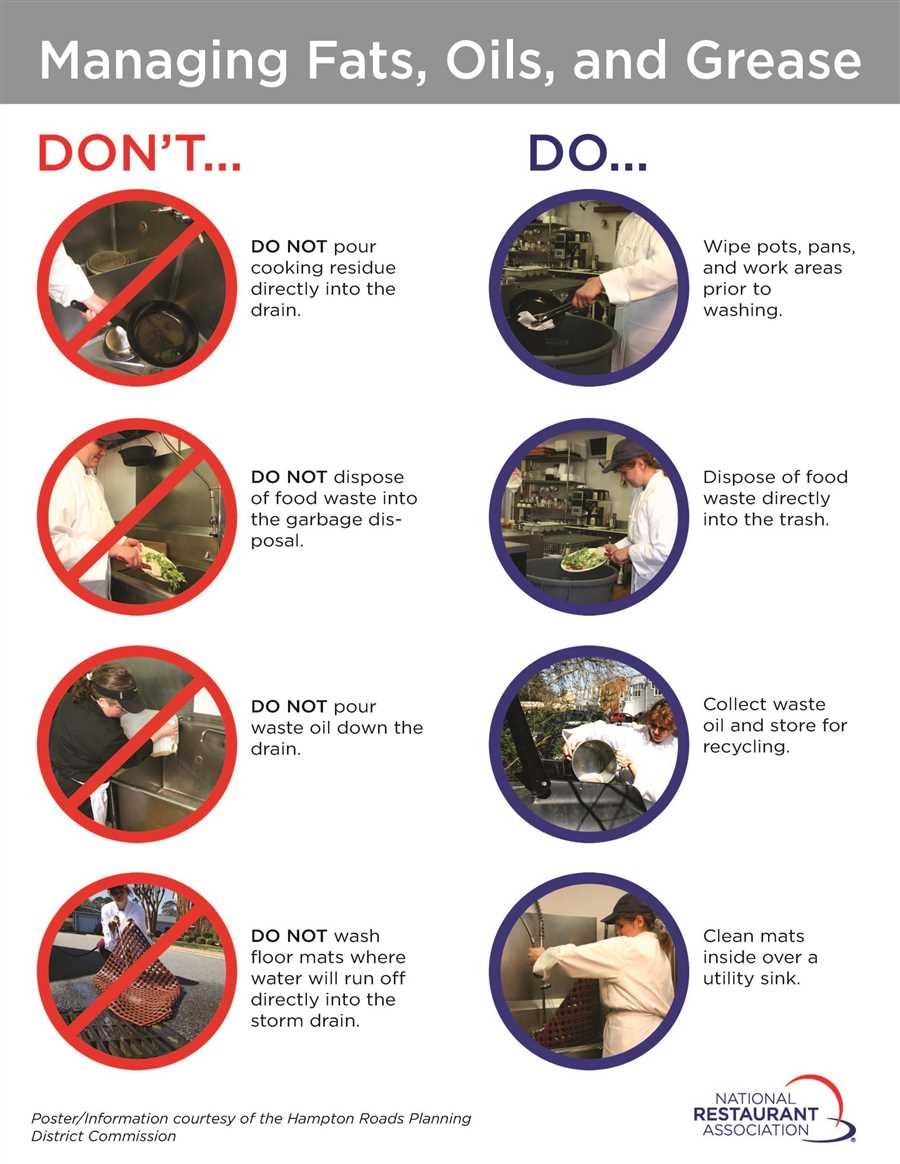





Cooking oil is a common ingredient used in many delicious recipes. However, when it comes to disposing of used cooking oil, it’s important to know the proper way to do so. Many people wonder if it is safe to dump cooking oil down the drain. Let’s find out!
The short answer is no, you should not pour cooking oil down the drain. Although it may seem convenient to do so, it can actually cause a lot of problems for your plumbing system and the environment. Over time, cooking oil can solidify and clog your pipes, leading to expensive repairs.
When cooking oil is poured down the drain, it can also cause blockages in the municipal sewer systems and water treatment plants. These blockages can have a negative impact on the environment by causing backups, overflows, and polluting water sources. It can also harm wildlife and their habitats.
Instead of pouring cooking oil down the drain, it’s best to let it cool and store it in a sealable container. Once the container is full, you can dispose of it in the trash or recycle it at a local recycling center. Some cities even have special drop-off locations for used cooking oil. Remember, it’s always important to check with your local waste management facility for specific guidelines on how to dispose of cooking oil properly.
Can you dispose of cooking oil down the drain?
When you pour cooking oil down the drain, it can cause a variety of problems. Firstly, oil can solidify and clog the pipes, leading to blockages and potential plumbing issues. This can be both costly and time-consuming to fix.
Additionally, pouring oil down the drain can harm the environment. When cooking oil enters the sewer system, it can mix with other substances and form fatbergs. Fatbergs are large masses of solidified fat, oil, and grease that can block sewer lines and cause sewage backups, leading to pollution and damages to the ecosystem.
So, what should you do with your cooking oil instead? The best way to dispose of cooking oil is to let it cool down and then pour it into a container with a lid, such as an empty water bottle or a sealed jar. Once the container is full, you can throw it in the trash. Don’t forget to securely close the lid to prevent any leaks or spills.
If you have a large amount of cooking oil, you may also consider recycling it. Some recycling centers and organizations accept used cooking oil, which can be processed into biodiesel or other useful products. Check with your local recycling facilities for proper disposal options.
By properly disposing of your cooking oil, you can prevent potential plumbing problems and contribute to a cleaner environment. So remember, never pour cooking oil down the drain – always choose the correct disposal method instead.
The environmental impact of dumping cooking oil
Dumping cooking oil down the drain may seem like a convenient way to dispose of it, but it can have serious negative environmental consequences.
Water pollution

When cooking oil is dumped down the drain, it can make its way to rivers, lakes, and oceans, causing water pollution. Oil does not mix with water and creates a thick layer on the surface, blocking sunlight and oxygen from entering the water. This can harm aquatic plants, algae, fish, and other marine life.
Clogged pipes and sewage systems
As cooking oil cools down, it solidifies and can clog pipes and sewage systems. This can lead to costly repairs and backups of wastewater. In extreme cases, it can result in sewage overflow, which poses health risks and can contaminate local water sources.
Proper disposal methods
Instead of dumping cooking oil down the drain, there are proper disposal methods that can help minimize the environmental impact:
1. Reuse or recycle: If the cooking oil is still in good condition, consider reusing it or donating it to local organizations that collect used cooking oil for biofuel production. Some recycling centers also accept cooking oil.
2. Let it solidify: Allow the cooking oil to cool and solidify in a non-recyclable container. Once solid, you can dispose of it in the regular trash.
3. Take it to a recycling center: Research local recycling centers or drop-off locations that accept cooking oil for safe disposal. These facilities use it to produce biodiesel or other renewable energy sources.
Conclusion
Dumping cooking oil down the drain may be convenient, but it can have severe consequences for the environment. It is crucial to take the necessary steps to dispose of cooking oil properly to prevent water pollution and clogged pipes. By reusing, recycling, or utilizing designated disposal methods, individuals can make a positive impact on the environment and protect aquatic life and water sources.
Alternatives to dumping oil down the drain
When it comes to disposing of cooking oil, pouring it down the drain is not a recommended option. It can cause clogs in your plumbing system and have negative effects on the environment. Fortunately, there are several alternative methods for getting rid of cooking oil responsibly:
1. Let it solidify: Allow the oil to cool and solidify by leaving it in the pan or a heat-resistant container. Once solidified, it can be placed in a sealed bag and thrown in the regular trash.
2. Reuse or repurpose: If the oil is still in good condition, consider reusing it for future cooking or finding alternative uses for it. For example, you can use it to lubricate squeaky hinges or polish wooden furniture.
3. Recycle: Some areas offer recycling programs that accept used cooking oil. Research local recycling centers or community collection events where you can drop off your oil for proper disposal.
4. Compost: If you have a backyard composting system, you can add small amounts of cooking oil to the compost pile. Be sure to mix it well with other organic materials to prevent odors and pests.
Remember, proper disposal of cooking oil is important for both your plumbing system and the environment. By choosing one of these alternatives, you can do your part in minimizing the negative impact of oil disposal.
Proper disposal methods for cooking oil

Properly disposing of cooking oil is essential to maintain the health of our plumbing systems and protect the environment. Pouring cooking oil down the drain can lead to clogged pipes, sewage backups, and water contamination, so it is crucial to follow the right disposal methods.
1. Allow the cooking oil to cool down
After cooking, allow the oil to cool down completely. Hot or warm oil can cause burns or damage to the containers you use for disposal.
2. Store and reuse
If the cooking oil is still in good condition, you can store it in airtight containers and reuse it for future cooking. Strain out any food particles before storing to prevent spoiling.
3. Dispose of in the trash
If the cooking oil is no longer reusable or has gone bad, it should be disposed of in the trash. Pour the oil into a sealable container, such as a plastic bottle or jar, and secure the lid tightly. Place the container in a garbage bag and dispose of it with your regular trash.
Remember to check with your local waste management facilities or recycling centers for any specific guidelines or collections for used cooking oil. Some areas have designated drop-off points or recycling programs for oil recycling.
The consequences of clogged drains
Cooking oil is a common household item that should never be dumped down the drain.
When cooking oil is poured down the drain, it may seem harmless at first, but it can lead to serious consequences. One of the main consequences is that it can clog the drains.
When oil cools down, it solidifies and forms a thick layer that clings to the inside of the pipes, narrowing the passage for wastewater to flow through.
Over time, if cooking oil continues to be dumped down the drain, the buildup can become severe enough to completely block the drain, resulting in backups and overflowing sinks.
In addition to clogged drains, a buildup of cooking oil can also attract pests.
This is because the oil provides a food source that can attract insects and rodents.
The presence of pests in your home can not only be frustrating but also pose health risks.
Furthermore, clogged drains can lead to expensive plumbing repairs.
A professional plumber might need to be called in to clear the clog, requiring time and money to fix the problem.
Overall, the consequences of clogged drains can be avoided by properly disposing of cooking oil.
Instead of pouring it down the drain, it is recommended to let the oil cool, and then dispose of it in a sealed container in the trash.
By taking these small steps, you can prevent clogged drains, save money on plumbing repairs, and maintain a clean and pest-free home.
How to reuse or recycle cooking oil
Properly disposing of used cooking oil is important for both environmental and plumbing reasons. Instead of dumping it down the drain, consider these alternative ways to reuse or recycle your cooking oil.
1. Store and reuse: If the oil is still in good condition, you can strain it through a fine-mesh sieve or cheesecloth to remove any food particles. Store it in a clean, airtight container for future use. Reusing cooking oil is ideal for deep frying foods.
2. Donate to animal shelters: Many animal shelters accept donations of used cooking oil. They can use it to supplement animal diets or as a heating source during colder months. Contact your local animal shelter to inquire about their oil donation policies.
3. Compost: If you have a backyard compost pile, small amounts of used cooking oil can be added. Mix it with other composting materials like vegetable scraps and leaves to help break it down. Avoid adding large quantities of oil, as it can disrupt the composting process.
4. Recycle: Some cities have specialized recycling programs for used cooking oil. Research local recycling centers or collection points where you can drop off your oil. It will be properly processed and used as biofuel or converted into other usable products.
5. Dispose properly: If none of the above options are feasible, it’s important to dispose of cooking oil properly. Check with your local waste management facility on their guidelines for proper disposal. They may provide specific instructions for handling and disposing of cooking oil in your area.
Note: Avoid pouring cooking oil down the drain or toilet as it can cause clogs in plumbing systems and contribute to environmental pollution.
Questions and answers
Is it safe to pour cooking oil down the drain?
No, it is not safe to pour cooking oil down the drain. Cooking oil can solidify and clog the pipes, leading to blockages and sewage backups.
What are the consequences of pouring cooking oil down the drain?
Pouring cooking oil down the drain can cause clogged pipes and sewer backups. It can also harm the environment as the oil may end up in rivers and oceans, damaging aquatic life.
Can I dispose of cooking oil in the trash?
It is best to avoid disposing of cooking oil in the trash as it can leak and create a mess. Instead, you can let the oil cool down, pour it into a container, and take it to a recycling center or a designated oil disposal facility.
How can I properly dispose of cooking oil?
The proper way to dispose of cooking oil is to let it cool down, pour it into a sealable container, and take it to a recycling center or a designated oil disposal facility. Some cities also have special collection points for used cooking oil.
What happens if I accidentally pour a small amount of cooking oil down the drain?
If you accidentally pour a small amount of cooking oil down the drain, it is unlikely to cause immediate problems. However, it is still best to avoid doing so, as repeated small amounts can accumulate and eventually cause clogs in the pipes.
Is it safe to pour cooking oil down the drain?
No, it is not safe to pour cooking oil down the drain. Grease and oil can solidify and clog the pipes, leading to blockages and expensive plumbing repairs.








